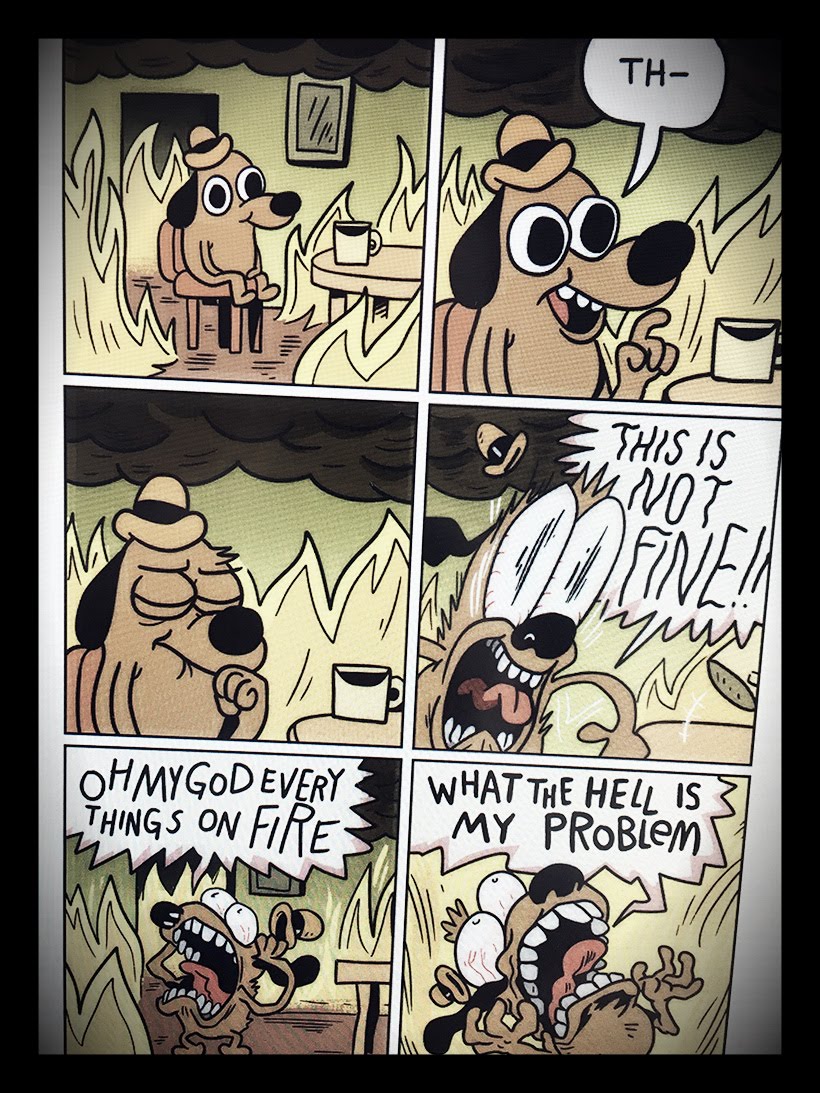fine!
casting news further conclusions
 remake 3 ago 2016 de KC Green ao seu clássico "this is fine"
remake 3 ago 2016 de KC Green ao seu clássico "this is fine"Fake news, misinformation, disinformation, network propaganda, conspiracy theories, bitcoin, bots (good, bad, and neutral), social media and news feed algorithms, filter bubbles and echo chambers, tweetstorms, memes and memetic warfare, doxxing, hate speech, revenge porn, clickfarms, manufactured outrage, de-platforming, quarantining, data breaches, computer hijacking, Cambridge Analytica, and countless discussions around regulating social media — this, of course, is not a finite list, but rather just some examples
in "Catching up with 'Neuland'" dez 2018
Terminando (?) de previsões tecemos uma lógica entre os destaques escolhidos. Primeiro: porque nasce torto — uma para a academia, outra vez.
It’s faculty who are preventing journalism curriculum from becoming more digital: the predominant obstacle to digital curriculum decisions at these institutions was individual members’ inability or unwillingness to learn new concepts and technologies. This situation is untenable. Students need exposure to current media platforms in a modern curriculum and faculty interests and competencies must align with those needs.
in "For journalism curriculum to change, its faculty needs disruption" dez 2018
Outros obstáculos, inabilidades ou unwillingness de situações insustentáveis — talvez porque lhes falta a formação? — demora-se na incompreensão da mudança dos tempos e o papel que cabe às audiências.
The dominant mindset in media is that journalists are the ultimate arbiters of information and know best what stories to tell and how to find them [but] audiences are increasingly becoming an integral part of the reporting process and reporters ask them to share their expertise and experience around specific topics. Newsrooms should think about audience needs as part of their overall strategy and continue to incorporate engagement efforts into their reporting workflows.
in "Newsrooms will prioritize audience needs" dez 2018
Workflows que têm um handycap insuperável na variante $$$.
Yes, yes, yes, journalism is about integrity and spreading information, but it’s also workers creating products, and consumers have been lucky to get this far into the internet age without having to pay much as news sites (especially younger ones) have been largely giving away products for free.
in "Good luck convincing us millennials to pay" dez 2018
Aqui temos que abrir um parêntesis em consumidores, especially younger ones.
Generation Z represent the audience of journalism’s future. “Gen Zs” were not only born with the Internet on full blast but also have had unprecedented access to cell phones. In fact, they have never known a world without cell phones. Whether it’s Instagram, a media outlet’s Snapchat channel, or push alerts they may or may not have meant to turn on, Gen Zs are consuming news at an unprecedented pace and volume, whether it’s intentional or not.
in "Reaching Generation Z beyond the coasts" dez 2018
...continuando de teens e $$$:
At this point, it seems clear that ads are not going to reliably drive profits in the digital media age. Without ad-driven money, the industry is turning towards subscription and membership models. At a certain point, all the tricks a company can think up — ads, VC funding, branded partnerships, events, data collection — won’t be enough to consistently prop a company up without consumers explicitly paying for products. “Paying for journalism,” as a concept, is a harder sell to millennials considering both the news environment we’ve grown up with and that we’re, on average, poorer than past generations.
in "Good luck convincing us millennials to pay" dez 2018
Outra hardsell, uma outra conclusão em demografias mais alargadas:
2019 is the year we finally face up to what we already know: No commercial model for journalism can adequately serve society’s democratic needs, no purely profit-driven media system will ever solve the local journalism crisis.
This coming year, as advertising-dependent journalism continues its slow death, as vulture capitalists continue to pick over the bones, as news rooms continue to hollow-out, we will come to see systemic market failure for what it is. If we start with the premise that commercial journalism is a dead end for what our democracy requires, it may entirely reorient tired conversations about the future of news. It might free us to think more creatively and more boldly.
in "We will finally confront systemic market failure" dez 2018
À vossa criatividade: sejam ousados. Não somos os únicos a ver uma tendência a surgir. Hey, teens: somos amigos?
News consumption is often conceptualized as a cerebral activity that attests to our ability to be rational, truly modern citizens. . But for some years now news organizations have been increasingly addressing soft benefits, reinventing themselves not as an authoritative instructor — but as a friend that keeps you up to date. This shift is the direct result of some foundational changes in the media industry. Most people have access to many more news sources than they had 20 years ago, so they can select their news on the basis of much more nuanced criteria. Journalism now seeks to be embedded in our social life, not only our intellectual activities. Increasingly, it pleads not only to our cerebral side, but also to social affinities and shared values.
The signs are abundant that media is moving back from a 20th-century mass market to a collection of artisans who keep close ties with specific patrons, based on shared social, cultural and normative understandings.
in "Journalism wants to be your friend, not your teacher" dez 2018
